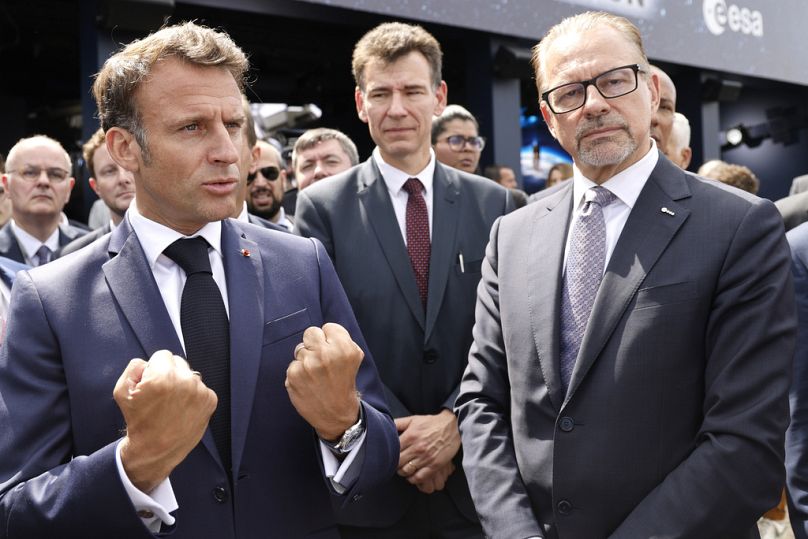Steel sharpens steel. Great people and great companies throughout history and across the world have taken inspiration even from their fiercest rivals, using them as fuel to keep working hard and improving, Bogdan Gogulan writes.
"China’s growing space program in Latin America concerns U.S. Pentagon", is just one of recent headlines in major outlets across the pond. And it should concern Europe, too. China’s progress in the new "space race" has been extraordinary.
 ADVERTISEMENT
ADVERTISEMENT
 ADVERTISEMENT
ADVERTISEMENT
In the past few years alone, China has landed a spacecraft on the far side of the moon; sent the BeiDou satellite — a rival to the US-owned Global Positioning System (GPS) — into space; and orbited, landed and deployed a rover on Mars.
In just the past few months, it has successfully launched and landed a commercial rocket, announced ambitions for a moon base and set out plans to double the size of its space station. Executive Director of the International Astronautical Federation Christian Feichtinger described China’s space industry, simply, as "booming".
The risk, for Europe, is that it gives up entirely on its plans to be a genuine competitor in space — something that is eminently achievable if the right choices are made soon.
Already, Europe seems to be dragging its feet, persevering with approaches that need to evolve while China and the US go from strength to strength.
All the while, Europe leans heavily on its allies across the Atlantic, where a more competitive environment exists, even though the continent is awash with talent and innovation.
What does Europe need to do – and why?
Fragmentation, centralisation, and geo-return
Europe’s fragmentation is the secret to its innovative spirit. When a diversity of ideas, perspectives and experiences are brought together, magic happens. But fragmentation is also why funding space tech in Europe is such a headache.
In Europe, the European Space Agency, the European Union and national governments are jointly responsible for funding space companies, and political considerations complicate things further.
As a result, there is no unified, continent-wide space strategy. Everyone is thinking about their little corner of the continent.
In China, by contrast, the space strategy is highly centralised, which may stifle dynamism to an extent but succeeds in directing the flow of money into the areas that need it most.
Europe must find a middle way, preserving its diversity while bringing companies together for strategic initiatives, such as IRIS2.
The European Space Agency’s policy of "geographic return" exists for a reason. Europe is a continent, not a country, and the job of supranational bodies is to balance as best they can the needs and wants of the continent and its member states.
Nevertheless, the geographic return has shown its shortcomings. By stating that any investment made by a member state must be returned to the same amount in industrial contracts, it increases the likelihood of there being unnecessary overheads while restricting competition.
In other words, the balance between the needs of the continent and the needs of its member states is out of kilter. And it is worth remembering that if Europe on the whole thrives, all member states will ultimately benefit, too.
Europe's strength lies in inspiring respect
The US’ main space agencies take a different approach to Europe. NASA’s strategy, for example, is demand-driven, which is to say that smaller companies are invited and encouraged to compete to build, design and develop whatever space technology NASA needs.
Rather than inviting a select number of companies to develop specific parts, as Europe currently does, NASA lets companies force their way in, so to speak, by virtue of being the best placed to respond to a specific demand.
The result is space tech of high quality, with fewer inefficiencies, able to be produced at a lower cost. Inefficient procurement in Europe has historically caused delays.
China is going at it alone. Europe does not have to.
Indeed, one of Europe’s strengths as a continent is its ability to inspire respect and collaboration between people of a wide variety of linguistic, cultural, religious and historical backgrounds.
It can forge space alliances with nations like India, the countries of the Middle East, Canada and Japan, all of which have bold space ambitions and could benefit by cooperating with Europe.
By working with them, Europe can help to bring about a balanced global space ecosystem and affirm, at the same time, that humanity’s space ambitions should ultimately be on behalf of all of humanity, and not one people or country.
The clock is ticking
Europe needs to act soon because China shows no signs of slowing down and is already pulling away.
Some recent news is that China plans to build two large internet satellite constellations, Guowang and G60 Starlink.
And that sends a clear message: they want to develop their own systems and infrastructure rather than rely on other countries. In other words, they intend to be completely self-sufficient and to compete.
This could rapidly affect the present dominance and revenue of companies like SpaceX and the success of Amazon's Project Kuiper while leaving European companies by the wayside.
Steel sharpens steel. Great people and great companies throughout history and across the world have taken inspiration even from their fiercest rivals, using them as fuel to keep working hard and improving.
China’s strides in space should therefore inspire Europe (and the US) to make their own space sectors better.
Through intelligent investment, structural reforms, innovation-friendly policies and an embrace of competition at home and collaboration abroad, Europe can not only continue to make progress in the space race but begin to catch up with China.
Enough energy, education, innovation and courage exist in Europe. They just need to be harnessed.
Bogdan Gogulan is the CEO and Managing Director of NewSpace Capital.
At Euronews, we believe all views matter. Contact us at view@euronews.com to send pitches or submissions and be part of the conversation.












